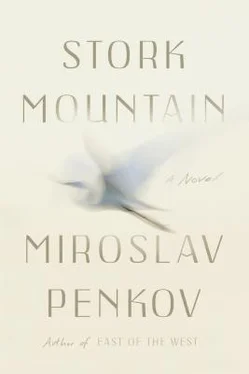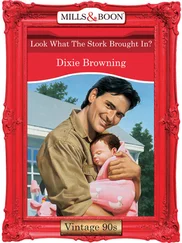Miroslav Penkov - Stork Mountain
Здесь есть возможность читать онлайн «Miroslav Penkov - Stork Mountain» весь текст электронной книги совершенно бесплатно (целиком полную версию без сокращений). В некоторых случаях можно слушать аудио, скачать через торрент в формате fb2 и присутствует краткое содержание. Год выпуска: 2016, Издательство: Farrar, Straus and Giroux, Жанр: Современная проза, на английском языке. Описание произведения, (предисловие) а так же отзывы посетителей доступны на портале библиотеки ЛибКат.
- Название:Stork Mountain
- Автор:
- Издательство:Farrar, Straus and Giroux
- Жанр:
- Год:2016
- ISBN:нет данных
- Рейтинг книги:4 / 5. Голосов: 1
-
Избранное:Добавить в избранное
- Отзывы:
-
Ваша оценка:
- 80
- 1
- 2
- 3
- 4
- 5
Stork Mountain: краткое содержание, описание и аннотация
Предлагаем к чтению аннотацию, описание, краткое содержание или предисловие (зависит от того, что написал сам автор книги «Stork Mountain»). Если вы не нашли необходимую информацию о книге — напишите в комментариях, мы постараемся отыскать её.
Stork Mountain — читать онлайн бесплатно полную книгу (весь текст) целиком
Ниже представлен текст книги, разбитый по страницам. Система сохранения места последней прочитанной страницы, позволяет с удобством читать онлайн бесплатно книгу «Stork Mountain», без необходимости каждый раз заново искать на чём Вы остановились. Поставьте закладку, и сможете в любой момент перейти на страницу, на которой закончили чтение.
Интервал:
Закладка:
“Stay still at least!” he barked. She wouldn’t. And when he touched her cheek he found out why: a whole week before the dancing she was already burning with the nestinari fever.
“I’m not,” she cried, and kept on rocking in her chair.
They had a fight. If not of herself, Grandpa cried, she should think of the baby. To hell with ritual and dance, he’d take the baby to Burgas himself!
Now it was Lenio’s turn to plead. True, her father was a wild man, but he was a man nonetheless. And so were her brothers. Hadn’t they met Grandpa in their village? Hadn’t they treated him with kindness and respect?
She’d disgraced herself, that too was true. She’d lost her bond to kin and blood. But her bond to the saints remained. And if she couldn’t walk the fire, at least she could be close to those who did.
“Lock us up in the house,” she said. “I won’t go out for a week. But let me hear the bagpipes singing, the holy drum. And only when my father leaves Klisura, you let me out.”
It’s here that Grandpa held her and the baby. Or so I see them when I close my eyes. He smothers them with kisses and Lenio is laughing, tickled by his prickly beard. The baby giggles.
“Let go!” she cries at last in jest. But Grandpa holds them tightly. He kisses them again and then again.
At least I know I would.
FIVE
I SEE THEM with merciless clarity — Captain Vangelis and his sons, coming down the mountain, like black storks. I see the bundle with the icons, roped across the captain’s back, the mud on his sons’ tired faces. I see the knives in their sashes, the ends of their mustaches curved up themselves like knives. With every step their musk grows thicker; the air is heating up and nearing a boil.
I know they too can see me. The jaws of time have closed. The great abyss has been erased and nothing stands between us. When they face my grandfather at the gates of the mayor’s house, it’s me they’re facing. When Grandpa bids them welcome, it’s I who really speaks.
“Welcome, welcome, Captain Vangelis,” I tell him in Greek. “We’ve lived another year.”
“May Saint Kosta give you health, vekilin ,” the captain says, and grabs my arm firmly, all the way up by the elbow.
“Come in,” I tell his sons, Captain Elias and his kin, the women, some of whom I’ve never met before. In the yard they wash their feet. Muddy water flows into the roots of the unkempt vine. Then, dinner on the terrace.
They’ve heard the awful news of course, but no one asks until I speak. “The mayor died a manly death,” I lie. “By his own hand. He didn’t wait for old age to make a mockery of him.”
“Tomorrow,” Captain Vangelis tells me, “you’ll take us to his grave.”
“That I will do,” I say, and I refill the glasses with rakia . “There is more stew,” I tell one of the women who’s already emptied her bowl. “There is banitsa . There is bread.”
“Teacher, your Greek is very good,” one of the captain’s sons tells me, and for the first time I can sense spite in his voice.
“But it’s a woman’s Greek,” another says.
This is as far as they will go. No one asks about Lenio: if she is well, if she is somewhere near. Yet I can sense that there is more to come.
That night I leave the nestinari in the mayor’s house. Back in the school, Lenio is pacing circles, the baby in her arms. She doesn’t see me right away and for a time I watch her, hidden. She carries the child the way she would an icon across the coals; her steps are just as frantic, her face illuminated and just as streaked with sweat.
“They have arrived,” I say at last. She startles and when she looks at me her eyes are muddy.
“It’s time,” she says, “to bolt the door.”
SIX
FOR THREE DAYS the Greeks rested. For three days Lenio and the baby remained locked up in the house, a giant log bolting the front door on the outside. Each morning one of the Greek women called to Grandpa in secret. Each morning, she gave him some of the food she’d cooked and kissed his hands.
“Aunt Eleni,” Lenio guessed with the first bite. She knew the way her auntie’s dolma tasted.
And only when she ate, with an appetite Grandpa had never seen in her before, was the gloom lifted from Lenio’s face. Else she sat by the window, rocked the child, and stared vacantly across the yard, the roofs, the Strandjan hills.
She was safe inside the school. And would be safe even when the nestinari started dancing. She’d hear their drum, the screeching of their pipes. Her heart would take a leap and she would cry just like an owl. She would be dancing, but away from them. And when they ate their meal in the konak she too would eat her meal. In safety.
This is the ending I would like to give: the night has passed; the sun has risen. And soon the Greeks all vanish up the hills. Only then does Grandpa roll away the log. Only then does Lenio step out of her prison, the baby cooing against her chest.
Alas. This ending isn’t hers.
SEVEN
JUNE 3. The feast day of Saint Constantine and Saint Elena. Early, early, Grandpa and the nestinari awoke Father Dionysus. Early, early, he blessed the icons in the church, and then the village boys, Vassilko in their lead, carried them to the walnut. The konak , the spring of Saint Constantine, the spring of Saint Elena. The ritual was followed step by step. Then the konak again. Back to the church, where Grandpa slaughtered a ram kurban .
Two carts of wood were set on fire beneath the ancient walnut tree. The crowd gathered. The sun went down. And in the dark the nestinari danced. At last the dance was finished. Quiet, exhausted, the nestinari ate their meal inside the shack. Outside, the crowd dispersed and it was time for Grandpa too to go back home.
At the threshold he bid the Greeks goodnight. He promised to meet them at the mayor’s house at sunrise. They’d go to his grave once more and then — the road and the mountain.
“Till morning,” Captain Vangelis said, too tired to raise himself from the floor.
“Till morning,” Grandpa answered. He picked up the candelabra, the icon lamp, and hurried to return them to the church.
Father Dionysus was sitting on the church steps.
“So it’s over, this godlessness of yours?”
Tired, Grandpa sat down by his side. The Pope offered him a smoke and Grandpa lit up.
“I’m tired, brother,” Grandpa said. He knew he should be going home to Lenio as quickly as he could and yet his feet were brittle iron thrown into the furnace — the soles, the tendons, every little bone had caught aflame. His shoulders were on fire; his back was breaking. So just a little rest, he thought, and he’d be going home.
“I’m tired. Dear God,” he said again. “What are we doing, brother? We’ve ruined half of Klisura. Changing these people’s names.”
“Dear God,” the Pope agreed, and he too lit up. “Have mercy on us all.”
They sat like this. The night grew very dark around them. Thick clouds had swallowed up the moon. A little rest, Grandpa kept thinking, a little rest and I’ll be on my way.
And then a dog started barking far away. And after that a closer dog, and then one closer still. The priest stood up. He pushed the door open and soft light spilled out from inside the church. It was in this light that they saw Vassilko, out of breath, covered in dust, weeds and dry leaves tangled in his hair.
“Breathe, damn it,” Grandpa cried, and helped him to his feet.
For a long time Vassilko couldn’t say a word. Stuttering, he reached into the bosom of his shirt; stuttering, he pulled out a piece of rope and lashed it across Grandpa’s hands. Of course, this wasn’t rope. It was a braid of human hair.
Читать дальшеИнтервал:
Закладка:
Похожие книги на «Stork Mountain»
Представляем Вашему вниманию похожие книги на «Stork Mountain» списком для выбора. Мы отобрали схожую по названию и смыслу литературу в надежде предоставить читателям больше вариантов отыскать новые, интересные, ещё непрочитанные произведения.
Обсуждение, отзывы о книге «Stork Mountain» и просто собственные мнения читателей. Оставьте ваши комментарии, напишите, что Вы думаете о произведении, его смысле или главных героях. Укажите что конкретно понравилось, а что нет, и почему Вы так считаете.











